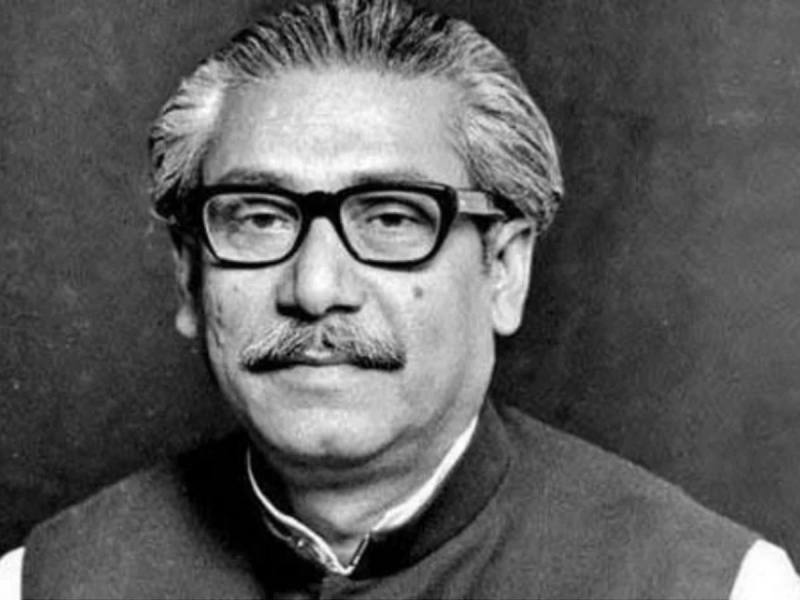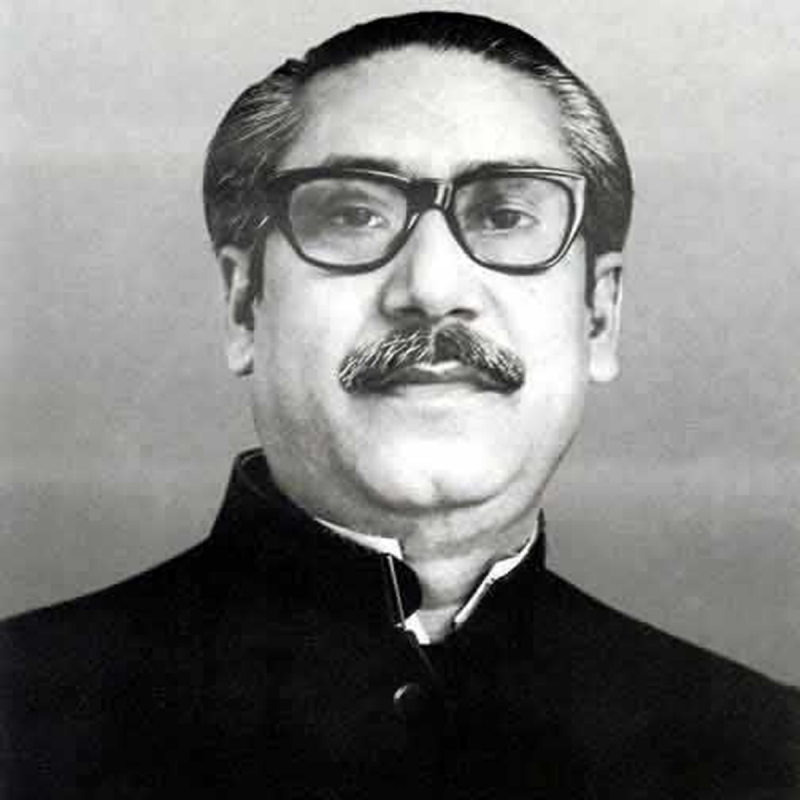Sheikh Mujibur Rahman
Sheikh Mujibur Rahman (17 March 1920 - 15 August 1975), often shortened as Sheikh Mujib or Mujib and also known as Bangabandhu, was a Bangladeshi politician, statesman, and Founding Father of Bangladesh who served as the country's first President and later Prime Minister from April 1971 until his assassination in August 1975. Mujib is credited with successfully leading the campaign for Bangladesh's independence from Pakistan. In Bangladesh, he is revered with the honorific title "Bangabandhu" (Bôngobondhu, "Friend of Bengal"), which is used around the world. He was a founding member and eventual leader of Pakistan's Awami League, which was founded in 1949 as an East Pakistan-based political party. Mujib is regarded as a pivotal figure in East Pakistan's efforts to gain political autonomy, as well as the driving force behind the Bangladesh Liberation Movement and the Bangladesh Liberation War in 1971. As a result, he is known as Bangladesh's "Jatir Janak" or "Jatir Pita" (Jatir Jônok or Jatir Pita, both meaning "Father of the Nation"). Sheikh Hasina, his daughter, is the current leader of the Awami League and the Prime Minister of Bangladesh.
Mujib, who was an early supporter of democracy and socialism, rose through the ranks of the Awami League and East Pakistani politics as a charismatic and forceful orator. He rose to prominence for his opposition to ethnic and institutional discrimination against Bengalis in Pakistan, who made up the majority of the state's population. During the height of sectional tensions, he outlined a six-point autonomy plan and was imprisoned for treason by Field Marshal Ayub Khan's regime. Mujib led the Awami League to victory in Pakistan's first democratic election in 1970. Despite gaining a majority, the ruling military junta did not invite the League to form a government. As civil disobedience erupted across East Pakistan, Mujib indirectly declared Bangladesh's independence in a landmark speech on March 7, 1971. On March 26, 1971, the Pakistan Army launched Operation Searchlight in response to the mass protests, in which Prime Minister-elect Mujib was arrested and flown to solitary confinement in West Pakistan, while Bengali civilians, students, intellectuals, politicians, and military defectors were murdered as part of the 1971 Bangladesh genocide. During Mujib's absence, many Bengalis joined the Mukti Bahini, which defeated the Pakistan Armed Forces during the Bangladesh Liberation War with the assistance of the Indian Armed Forces. Mujib was released from Pakistani custody following Bangladesh's independence due to international pressure and returned to Dhaka in January 1972 after a brief visit to Britain and India.
Mujib was elected Prime Minister of Bangladesh under the new country's parliamentary system. He tasked the provisional parliament with writing a new constitution proclaiming the four fundamental principles of "nationalism, secularism, democracy, and socialism," which reflect his Mujibism political views. In the country's first general election in 1973, the Awami League received a massive mandate. Mujib, on the other hand, had to deal with rampant unemployment, poverty, and corruption, as well as the 1974 Bangladesh famine. The government was chastised for denying indigenous minorities constitutional recognition and for human rights violations committed by its security forces, particularly the National Defence Force or Jatiya Rakkhi Bahini paramilitary. Mujib instituted one-party socialist rule in January 1975, amid rising political agitation. Six months later, he and the majority of his family were assassinated during a coup by renegade army officers. Following that, a martial law government was established. Mujib was voted the Greatest Bengali of All Time in a BBC poll in 2004. He is also remembered as one of the most important historical figures in Bangladesh.








